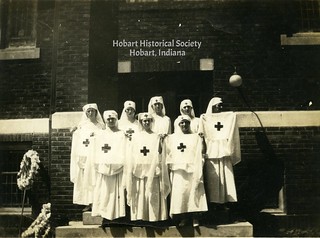
(Click on image to enlarge)
These were some of Hobart's Red Cross volunteers during World War I. Handwritten notes on the back of the original identify only four of them: in the first row, from the left: Blanche Roper and Lillian Burge. In the second row, at center, Mrs. Lacey; at the right end, Mrs. Messick. They are in front of the M.E. Church on Fourth Street. Image courtesy of the Hobart Historical Society.
As summer faded into autumn, a story was making the rounds in Hobart about Mary Bruce (the plumber's wife). Eventually it reached Mary's own ears, and she was astonished to learn what she'd been up to lately.
According to the story, in an act of patriotic voluntarism, Mary had knitted a sweater as something the Red Cross could give to some soldier headed overseas to fight for his country. She had slipped a note inside it, with her name and address, asking the recipient to write to her. After some time she received a letter from the soldier now wearing her sweater — but he told her he'd bought it at Marshall Field's department store in Chicago. The story's implication was that the Red Cross was taking donated goods and selling them.
Mary was so annoyed that she wrote in to the Gazette to denounce this ridiculous concoction, and the Gazette printed her letter. In the first place, Mary said, she did not knit a sweater; she did not even give a purchased sweater to the Red Cross; so of course all the rest of the story was utter nonsense.
As a piece of gossip, however, it's both inventive and efficient: it packs the maximum slander into the minimum narrative. In just a few sentences, it insults Mary (for being so forward as to ask a strange man to write to her), the Red Cross (for selling donated goods) and Marshall Field's (for buying what it should have known were donated goods). The only one who comes out unscathed is the (nonexistent) soldier — I suppose even gossips wouldn't cross that line.
Source: "Just a Canard." Hobart Gazette 28 Sept. 1917.


No comments:
Post a Comment